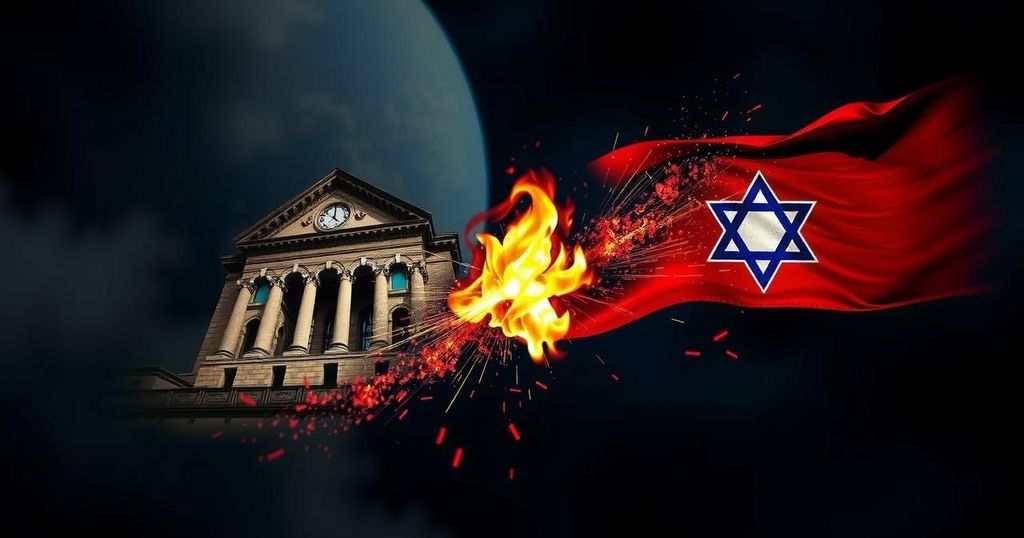In the context of escalating violence in the Middle East, Iranian leaders have threatened retaliation against Israel and the United States over recent military actions. Israel’s airstrikes have resulted in significant casualties in Lebanon and Gaza, while drone attacks claimed by Iraqi pro-Iran groups target Israel. Concurrently, legislative actions against UNRWA raise concerns about the humanitarian crisis impacting millions of Palestinians. As international and diplomatic tensions grow amid these hostilities, the region stands on the brink of further conflict.
Amid escalating violence in the Middle East, tensions have heightened significantly as Iran’s supreme leader, Ayatollah Ali Khamenei, issued a stark warning to both Israel and the United States, promising a “crushing response” if provocations continue. This statement comes in the wake of recent Israeli airstrikes that reportedly killed dozens in Lebanon and Gaza, exacerbating an already dire humanitarian situation. Iraqi pro-Iran factions have also claimed responsibility for four drone attacks on Israel’s Eilat, signaling a coordinated response to what they view as aggressions from Israel. Concurrently, the Israeli military reported intercepting drones near the Red Sea, further indicating the rising hostilities in the region. The Israeli parliament’s recent decision to restrict the operations of the United Nations Relief and Works Agency for Palestine Refugees (UNRWA) has drawn international criticism and raised concerns about the humanitarian implications for the estimated 2.3 million Palestinians dependent on its services. Experts warn that without UNRWA, which provides crucial healthcare, education, and food distribution, the situation could deteriorate dramatically in both the Gaza Strip and the West Bank. The violence also continues to unfold as Israeli airstrikes aim at Hamas militants, resulting in a staggering death toll and injuries. UN officials recently condemned the conditions in northern Gaza, describing them as “apocalyptic,” with dire warnings of impending disease and famine threatening the civilian population. This conflict occurs against the backdrop of U.S. attempts to broker temporary ceasefires amid increasing military engagements between Israel and Hezbollah, complicating already strained international relations. The situation remains fluid, with overarching implications for regional stability, humanitarian crises, and international diplomacy, particularly as the United States approaches its presidential election. The prospect of retaliatory actions and broader conflict remains a pressing concern as the involved parties navigate these heightened tensions.
The Middle East has been a longstanding site of geopolitical strife, particularly involving Israel and its relations with neighboring countries and groups. In recent months, aggressions have escalated significantly, particularly with the rise of attacks and military engagements involving Iran, Israel, and various militant groups in the region. This violence has resulted in severe humanitarian crises, especially in Gaza and Lebanon, where civilian populations face dire conditions. The UN’s involvement, through agencies like UNRWA, has historically sought to alleviate some of these challenges by providing essential services. However, recent Israeli legislative moves to undermine these operations highlight a deteriorating relationship between Israel and international humanitarian efforts.
In conclusion, the Middle East crisis continues to evolve with alarming rapidity, characterized by increased military confrontations and dire humanitarian implications. Iran’s threats of retribution, coupled with ongoing Israeli military offensives and the challenged operations of UNRWA, underscore the precarious nature of the region. The consequences of these hostilities not only impact the immediate populace but also pose significant risks for broader regional security and international diplomatic relations. As negotiations and ceasefire discussions are attempted, the situation remains unpredictable, with the potential for further escalation looming over the horizon.
Original Source: www.theguardian.com






